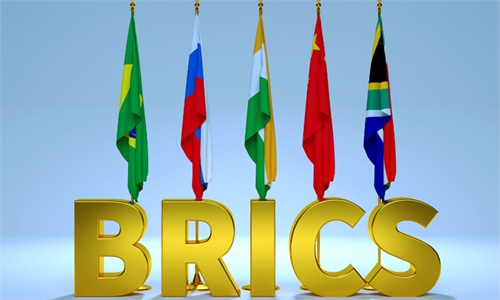
BRICS Photo: VCG
The increasing importance of the BRICS amid rapidly changing geopolitics is being reflected in the grouping's role in global security.
BRICS National Security Advisors are meeting from Monday to Wednesday in the host country of South Africa as part of the build-up to the highly anticipated summit of the bloc next month. Political and security cooperation is one of the original objectives of BRICS cooperation, and it is also one of the pillars of the current BRICS agenda. The Meeting of National Security Advisers and High Representatives on National Security serves as the main platform for the BRICS countries to discuss and carry out cooperation in the field of politics and security.
The current global security governance is undergoing systemic shocks with turbulent factors in the international situation increasing. The US is creating an atmosphere of confrontation and tension worldwide, utilizing the so-called Indo-Pacific Strategy and NATO to simultaneously encircle and contain China and Russia. Its aim is to maintain the old global order that the US monopolizes. To achieve this, the US has strengthened its various security cooperation mechanisms, coercing other countries to align with its interests. Song Zhongping, a Chinese military expert and TV commentator, told the Global Times that this approach is actually using a security mechanism to hijack the interests of others. In contrast, BRICS security cooperation emphasizes multilateral security and common security, which is greatly different from what the US advocates.
Zhu Tianxiang, director at the Center for BRICS Political and Security Studies, Institute of BRICS Studies of Sichuan International Studies University, told the Global Times that the BRICS mechanism has different ways and methods from Western-dominated mechanisms when dealing with global and regional hotspot issues. The discussion of all issues, including security issues, by the BRICS countries is based on consensus. There is no so-called dominance, and everyone is on an equal footing. The solutions to specific problems are also different from those in the West. Western countries often impose sanctions or even use military means, while under BRICS cooperation, peaceful methods such as promoting diplomacy, dialogue, negotiation and mediation are used. This has provided new ideas for regional and global security. At this meeting of BRICS National Security Advisers and High Representatives on National Security, Zhu said the Russia-Ukraine conflict is likely to be the focus of discussion, and "promoting peace and talks" will certainly take center stage.
Now, the security differences between Western countries and emerging countries, including developing ones, are widening, and ideological disputes on a global scale are intensifying. In order to make the BRICS cooperation mechanism more long-term and developmental, corresponding security mechanisms to ensure cooperation among BRICS countries must be established. This is also crucial for economic cooperation. Meanwhile, the deepening economic cooperation can in turn promote mutual trust among member states in their security cooperation.
Song believes it's difficult to maintain multilateralism and a multi-polar world through economic cooperation alone. In the field of traditional security, some countries in the West have suppressed emerging and developing countries in various ways; at the same time, in the process of economic cooperation, developing countries also face constraints in non-traditional security, such as terrorism, extreme nationalism, and separatist forces. All of these hinder economic development. This is why the BRICS should strengthen cooperation in the field of security.
The Global Security Initiative put forward by China advocates adapting to the changing international situation with a spirit of solidarity and responding to complex and intertwined security challenges with win-win thinking. It aims to eliminate the root causes of international conflicts and improve global security governance. This coincides with the multilateralism and common security pursued by the BRICS. Within the BRICS, although each country has its own national conditions, there is a broad consensus on jointly maintaining international security cooperation. Multilateralism is needed by emerging and developing countries. This is also the reason why more than 40 countries have expressed interest in joining the BRICS. It has a centripetal force, which is to promote a multi-polar world and allow emerging and developing countries to have more discourse power. Within BRICS, there is no one country that dictates and can erode the interests of other countries at will. In the early days of the BRICS, there were many voices badmouthing the prospect of the group, pointing out the different political systems, social systems, and ideologies of the member states. Zhu said although this is true, however, the way the BRICS has developed to this day, and the way economic and security cooperation has steadily advanced under the mechanism, show that those differences do not affect the unity and attractiveness of the BRICS and its role in the international system.
"This is the essence of multilateralism," said Zhu.

